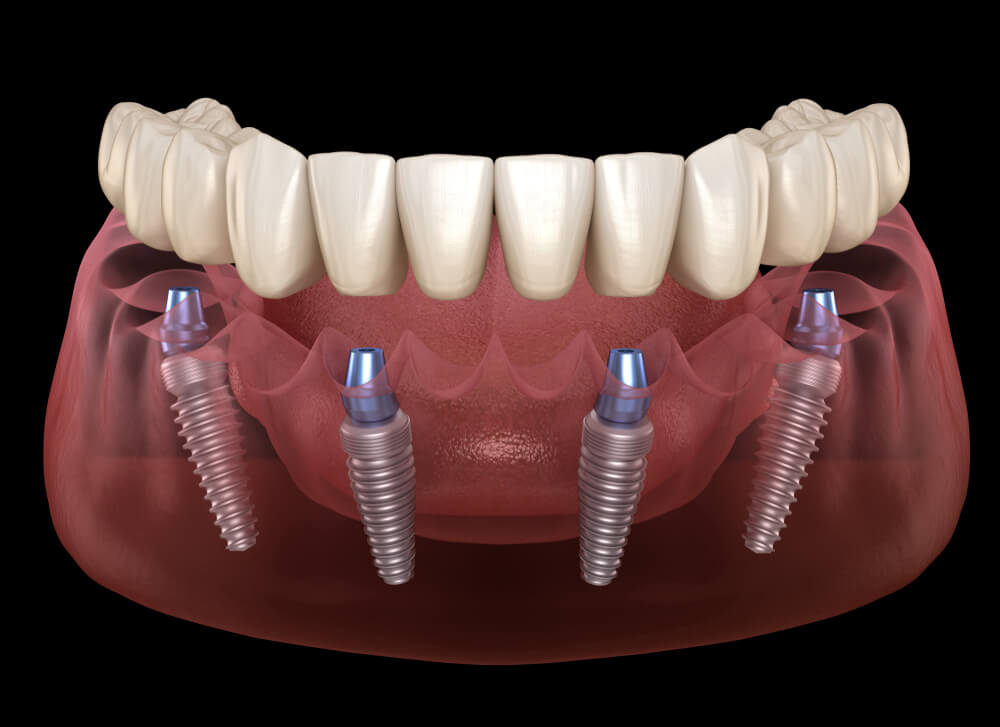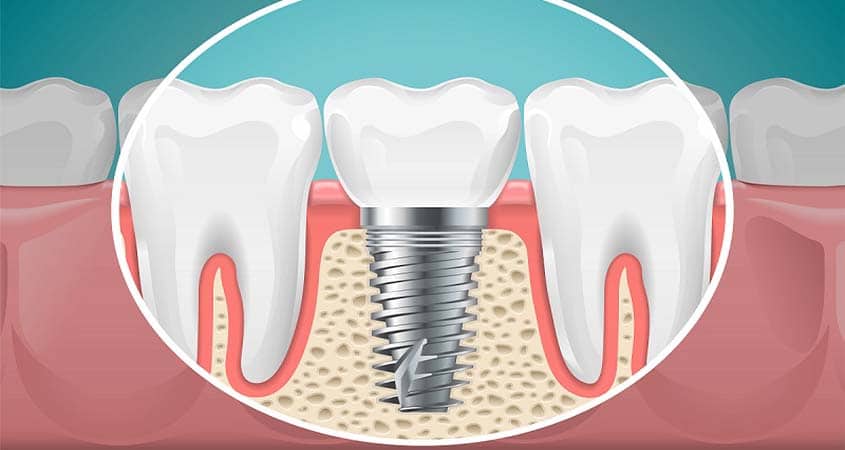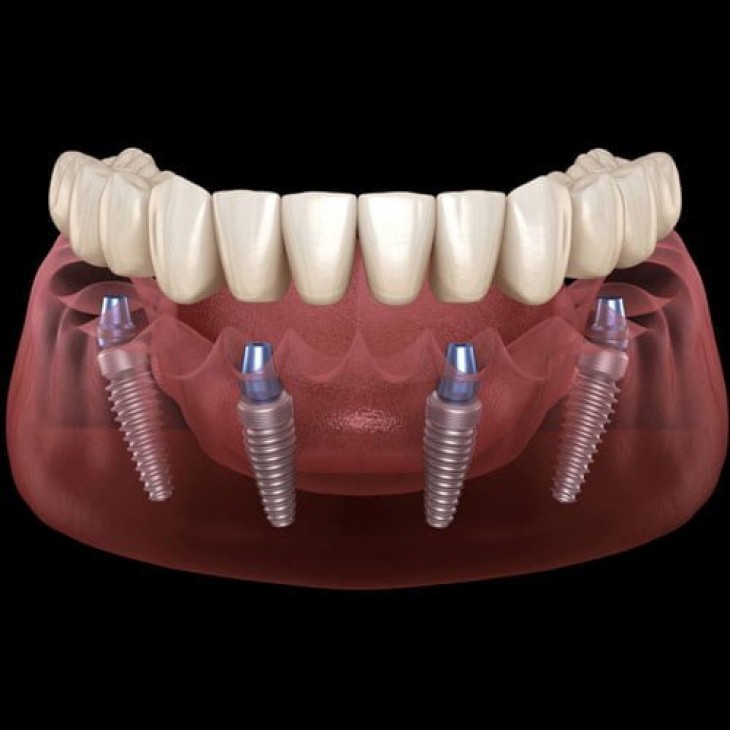
What is implant treatment?
Missing teeth formed in the mouth is the process of applying special materials called dental implants as artificial tooth roots. Dental implants, which have many origins and types, are a safe treatment method that can be applied for many years.
Why is implant treatment needed?
Bridge application in single tooth deficiencies requires cutting and covering the side teeth. This treatment may result in the loss of the cut teeth in the medium and long term. With implant treatment, applying it only to the area where the cavity has formed, provides protection of the surrounding teeth.
In case of multiple tooth deficiencies, the positioning of the implants in the jawbone after the selection of the prosthesis method is performed by the maxillofacial surgeon who performs the operation. In this way, optimum amount of implants are used in multiple missing teeth.
We also benefit from implant treatments in some traumatic situations.

Who can implants be applied to?
Implant application can be performed in all individuals whose bone development has been completed. Before the treatment, bone volume controls are made by the Oral, Maxillofacial and Dental Surgeon or Periodontologist. If the bone volume is not sufficient, periodontal treatments and bone volume increase treatment are applied. After sufficient bone formation, planning is made for the operation..
Implant treatment stages
Implant Examination
First of all, the Maxillofacial Surgeon examines the patient who wants to have an implant. At this stage, it examines the patient's suitability for implant treatment.
Jaw Bone Condition
Panoramic x-rays of the jawbone are examined through tomography when necessary. Bone density in the area to be treated is measured. The doctor chooses the type of implant that is suitable for the patient
Making the Implants
Before starting the implant procedure, the first thing to do is to apply local or general anesthesia. In this way, the patient is provided to feel pain during the procedure. After anesthesia, the area to be implanted is thoroughly cleaned. An incision is made in the gum. With this incision, the jawbone is reached.
Afterwards, a hole is made in the jawbone in the size of the implant. This hole takes place with a special caps. After the socket is opened, the implant is screwed into the formed cavity. The implant is expected to fuse to the jawbone. This boiling time varies from person to person. But the average duration is in the range of 1-3 months.
Preparation of Prostheses
After the implants are fused to the jawbone, the preparation phase of the prostheses comes. At this stage, the patient's tooth measurements are taken. In addition, the color of the tooth to be inserted is determined. After the preparation process of the prostheses, the prostheses are made in the determined dimensions in a private laboratory
Placement of Prostheses
At the last stage, the prosthetic teeth prepared are placed on the implants on the bone by screwing or gluing. As a result, the implant treatment is completed.
In which tooth deficiencies can the implant be applied?
Implant treatment can be applied in the absence of a single or several teeth, as well as in cases of complete edentulism.
All on four implants
It is the process of placing 6 implants in the upper jaw and 4 implants in the lower jaw in cases of total toothlessness in the lower and upper jaws where the jawbone melts too much. According to the patient's request, temporary prosthesis can be applied within 1-2 days.
In previous techniques, the main aim was to obtain bone by applying grafting (bone powder sowing) and complicated surgical procedures in areas where the patient's bone was insufficient, and this caused both the prolongation of the procedure and the patient's toothlessness in that process.
In the All On Four system, implants are placed without complicated surgical procedures and temporary fixed teeth are attached to the patient on the same day. Two or three months later, temporary dentures are removed and replaced with permanent fixed teeth.
Zygoma implants
It is the method applied for patients with very advanced bone resorption. While standard implants are 8-12 mm long, zygoma implants have dimensions between 30-50 mm. Implants are performed under general anesthesia, not under local anesthesia like other dental implants, and the operation is performed on the area known as the cheekbone. The operation takes approximately 2 hours..
Immediate implants
Implant placement at the time of tooth extraction is called immediate implant application. It is a highly preferred method if the patient is in the mouth, the bone structure is good and there is no acute inflammation in the tooth to be extracted. In cases where there is a possibility of infection, this application is not recommended.
Laser applied implants
In the area where the implant will be applied, the gingiva is lifted in the form of a lid with a laser. The implant slot is opened with the help of laser. Unlike the classical method, it causes less damage to the neighboring tissues since the operation is performed in a smaller area. Since there is no suture application, our patient's recovery time is shortened and complaints such as pain and swelling are reduced to a very low level.
Frequently asked questions about dental implants
What are the implant prices?
Implant prices vary in direct proportion to the origin of the material used and the desired prosthesis. Implants, which are generally used as imported, vary between 500-2000 $.
What are the conditions that make implant treatment difficult?
Extra tests may be requested before the application in our patients with diseases such as chronic heart diseases and blood coagulation problems.
What are the advantages of implant treatment?
Implants replace your real teeth in the most natural way possible. They are long lasting. It does not harm your teeth, gums and jawbone. With a good treatment planning, your healthy teeth do not need to be cut as in bridge treatment. It has a lifetime durability with good care. It is very comfortable to use compared to other prosthesis applications.
What can I eat after implant treatment?
Tedavi sonrası belirli bir süre çok sert yiyecekler yenilmemesi gerekmektedir. Sonrasında kemik implant uyumu sonrasında günlük hayatınıza devam edebilirsiniz.
Will I have a lot of pain after the implant operation?

Since the application is under local anesthesia, there is no pain during the procedure. However, after 2-3 hours, pain may occur, although it varies from person to person. In this case, you may need to use painkillers for a few days.
Will all implants be successful?
With the improvements made in this field, which is constantly developing technologically, a success of over 90% is achieved. However, in some cases, the implant may not fuse to the bone.
How to care for implants?
After the prosthesis is applied on the dental implants, cleaning should be done by brushing and using dental floss.
Implant treatment in Bursa/Turkey
Our Surgeon Dr.Dt.Burcu Taban graduated from İstanbul University Çapa Faculty of Dentistry in 2001. Between 2001-2012, she worked in different institutions in the public sector.
In addition, our Prosthesis Specialist Dr.Dt. Oğuz Süleyman Özdemir graduated from Hacettepe University Faculty of Dentistry in 2001. He completed his doctorate in Samsun Ondokuz Mayıs University, Department of Maxillofacial Surgery in 2008-2014. Dr. Dt. Oğuz Süleyman Özdemir has advence level English.
